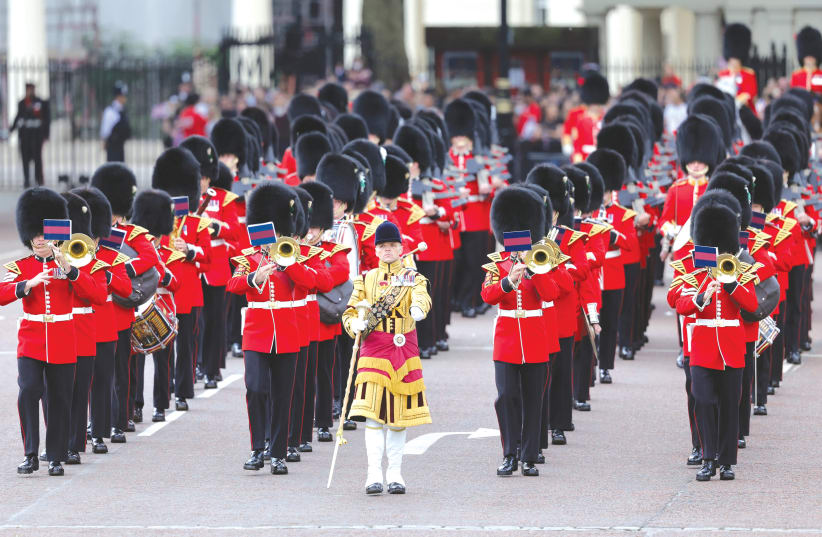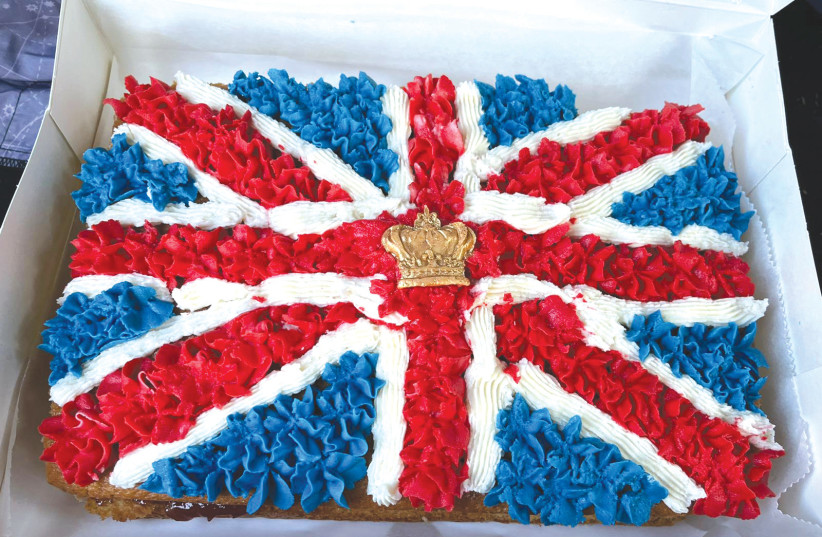Whether or not you’re in the UK, an expatriate Brit or just someone who loved The Crown, it’s clear that the world can’t get enough of the royal family.
Whether it’s the wedding of Kate Middleton to Prince William, the Meghan-Harry scandal or the precarious health of Queen Elizabeth II, there’s a larger-than-life aura that seems to surround the monarchy, which, no matter how tarnished, still shines brightly.
That glare is even more apparent this weekend as the United Kingdom of Great Britain and Northern Ireland are in the midst a four-day celebration, which began Thursday and ends on Sunday, in honor of Queen Elizabeth II’s Platinum Jubilee – the 70th anniversary of her accession to the throne. It will be the first-ever of its kind in the UK’s history, as she is the longest-reigning monarch in British history.
A quick scan of headlines in US and British media, including The Independent and The Guardian, produces headlines like: “Platinum Jubilee: The story of the royal family through their balcony photos”; “I’ve completely changed my mind about the jubilee – and the royal family”; and “Queen’s Platinum Jubilee: Why are beacons lit for big royal events?”
And it’s not just people in the UK who are getting ready to celebrate. British expats across the world are finding the jubilee spirit to be contagious, holding parties and celebrations of their own.
In Israel, as well, some expatriate Brits will be glued to the proceedings as the pomp unrolls through the weekend.
In Tel Aviv, a group of British-Israelis held an event dubbed Street Party in the Park on Thursday, celebrating the queen’s jubilee remotely with food, drinks and the same patriotic atmosphere of their counterparts back in Britain.
In Jerusalem, the Kumkum Tea House will be hosting a Platinum Jubilee champagne afternoon tea every day next week, promising nostalgic Brits that the café will be “decorated for the auspicious occasion.”
A history of jubilee celebrations
The first British monarch to celebrate a jubilee anniversary was Edward III, who ruled between 1327 and 1377. Records from his rule recount how, in 1376, he celebrated 50 years on the throne, or his golden jubilee, presiding over a weeklong jousting tournament held in London in February 1376. However, not much else was done to celebrate, as he was not in good health and died just over a year later.
The next recorded jubilee celebration was centuries later when George III (who ruled from 1760 to 1820) had his own golden jubilee celebration. This celebration was widely thought of as the first real jubilee, as Edward’s, some 400 years earlier, was considered unofficial.
During George III’s jubilee celebrations, various fairs and galas took place across the British Empire, several landmarks were commissioned, and in the king’s honor military deserters and prisoners of war were pardoned. Additionally, one village in southeast England decided that every child born during the jubilee year of 1809 should be named Jubilee George or Jubilee Charlotte, depending on the gender.
Queen Victoria, the next monarch to celebrate her jubilee, sat on the throne from 1837 to 1901. She served for 63 years and is the second-longest serving monarch in British history.
Her golden jubilee in 1887 was commemorated across the British Empire, just as King George III’s was. It was marked by parties, church services, fairs and parades, but also by the construction of several buildings and statues, including the Queen Victoria Statue in Windsor, designed by Sir Edgar Boehm.
As the second-longest reigning monarch, Victoria also lived to see her diamond jubilee, or 60th anniversary of taking the throne. Due to her age, the celebrations were not as large or as lengthy as they had been a decade earlier, but, nevertheless, it was again celebrated across the entire British Empire.
The next monarch to celebrate a jubilee was King George V, who had a more subdued celebration for his silver jubilee (25 years on the throne), as in 1935 the country was still recovering from World War I and was in the midst of an economic depression. However, this was the only jubilee celebration that George commemorated, as he died less than a year later.
Queen Elizabeth’s Platinum Jubilee
Moving on to the present day, Queen Elizabeth II’s Platinum Jubilee is the first of its kind, but it is by no means the first time she has celebrated a jubilee. In 1977 she marked her silver jubilee, in 2002 her gold jubilee, and in 2012 her diamond jubilee.
Over 20,000 events and street parties are scheduled to take place over the Platinum Jubilee weekend, alongside the main celebrations, which will be attended by the queen herself.
The official celebrations started on Thursday with the Queen’s Birthday Parade, in which 1,400 soldiers, 200 horses and 400 musicians set out in a procession, starting from outside Buckingham Palace, before moving down to Horse Guards Parade, the ceremonial parade grounds located in St. James’s Park.
Following the parade, all “working royals” (Prince Harry will not be in attendance, nor will the queen’s disgraced second son, Andrew) will watch a Royal Air Force flyover from the Buckingham Palace balcony.
The other main event, which will perhaps be enjoyed more by the public than by the queen herself, is the Platinum Party at the Palace concert.
The two-and-a-half-hour concert will feature dozens of iconic British performers, including Queen + Adam Lambert, Duran Duran and the 2022 Eurovision Song Contest runner-up, Sam Ryder. Twenty-two thousand people are expected to attend the concert, with 10,000 of the ticket holders having been chosen at random in a public lottery. Another 7,500 tickets were allocated to key workers, members of the armed forces, and charities.
Why are the British so passionate about the royal family and the jubilee?
For many, the royal family represents history and tradition, and celebrating the jubilee is seen as a shared way to express patriotism. The royal family is a valued part of Britain’s makeup for thousands of people, and is responsible for a large portion of the country’s tourism. Members of the royal family are patrons of thousands of charities, including medical charities, charities for children, and arts and culture programs.
For others, the jubilee celebrations are seen as a way for the country to come together despite whatever difficulties the people may be experiencing. This is especially important right now, after the last two years of the COVID-19 pandemic.
Just as in 1935, when King George V’s Silver Jubilee occurred during the Great Depression, the 2022 Platinum Jubilee is taking place at a time when prices are at an all-time high, and many businesses are struggling to stay afloat after two years of closures and restrictions. So with a four-day weekend ahead of them, pubs, restaurants and retail businesses are all hoping to receive a significant sales boost.
While the country’s admiration for the long-serving queen is unquestionable – she has been on the throne for longer than much of the country has been alive – members of the royal family are losing popularity, and fast. A poll conducted by The Sun newspaper ahead of the jubilee saw the queen receive a 91.7% approval rating, but her firstborn and successor, Prince Charles, received an approval rating of just 67.5%
An article published by Politico earlier in May titled “Britain’s last royal jubilee?” focuses on the idea that Queen Elizabeth II’s Platinum Jubilee not only marks the impressive length of her rule, but also the end of an era. The queen is 96 years old, she has been unwell several times in the past year, and her public appearances are less and less frequent.
This, combined with Charles’s underwhelming approval rating, has led many to question what role the royal family will play in the UK’s future.
“All royal jubilees come with a sense of public apprehension, and this will once again be the case,” the Politico piece states. “Some will be wondering whether [this] will be the last jubilee.”
Strong feelings about the royal family may also have nothing to do with celebrating this Jubilee Weekend.
Commenting on the historic event to The Jerusalem Post, Gal, a 23-year-old British-Israeli, sums up the feelings of those who are celebrating this weekend despite not being overly invested in the royal family. “I might not care much about the royal family, but a day off is a day off.”
Others have the opposite take.
Longtime Jerusalem resident Lisa Katz, originally from London, said that even though she wasn’t following the Jubilee, she does think fondly of the Queen.
“Even though I’ve lived in Israel more than 40 years, I do care about the Queen and worry what will happen when she is no longer with us,” she said. “I think she has been amazing for Britain, as a figurehead above politics, who can unite everyone; it is a stabilizing factor that while the police answer to government, the armed forces answer to her royal majesty; and, of course, the royal family is great for tourism. Long may she reign over her kingdom. God save the Queen!”

